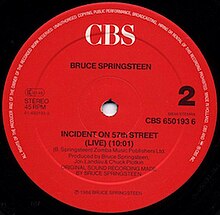Incident on 57th Street
| "Incident on 57th Street" | |
|---|---|

Label to release as B-side of "War" in Europe in 1986
|
|
| Song by Bruce Springsteen from the album The Wild, the Innocent & the E Street Shuffle | |
| Released | September 11, 1973 |
| Recorded | 1973 at 914 Sound Studios in Blauvelt, New York |
| Genre | Rock |
| Length | 7:45 |
| Label | Columbia Records |
| Writer(s) | Bruce Springsteen |
| Producer(s) | Mike Appel |
"Incident on 57th Street" is a song written by Bruce Springsteen that was first released on his 1973 album The Wild, the Innocent & the E Street Shuffle. It has been described by critics as a key development in Springsteen's songwriting career.
"Incident on 57th Street" was the last song Springsteen recorded for The Wild, the Innocent & the E Street Shuffle. As with the rest of the album, it was recorded at 914 Sound Studios in Blauvelt, New York. Springsteen had been working on it under the working title "Puerto Rican Jane." It was one of the first songs on which Springsteen felt like an "observer," writing whatever came out of him rather than self-consciously trying to write something specific. On the album, the piano solo at the end of the song segues directly into the guitar opening of the following song "Rosalita (Come Out Tonight)."
According to Springsteen, the theme of "Incident on 57th Street" is "redemption," a theme he would return to again many times. The story is set in New York City tells the story of "Spanish Johnny" and "Puerto Rican Jane." It has parallels to Leonard Bernstein's West Side Story in telling a Romeo and Juliet-like story with Latin American characters set in New York. Johnny is explicitly referred to as "a cool Romeo" and Jane as "a late Juliet.
Johnny comes to midtown Manhattan after getting beat up while trying to work as a male escort. Although rejected by everyone else, he finds redemption when Jane sympathizes with him, saying "Johnny don't cry." They sleep together, but when his old companions call to him asking him to join them in making "some easy money," he leaves Jane to join them. Jane tells him that "you can leave me tonight but just don't leave me alone." Johnny agrees to return to her tomorrow, although he doesn't actually know if he will be able to, telling her that "We may find it out on the street tonight, baby/Or we may walk until the daylight maybe." Springsteen leaves the ending ambiguous, leaving to the listener's imagination whether Johnny's adventure that night meets with a tragic end, or whether the lovers actually do get away.
...
Wikipedia
